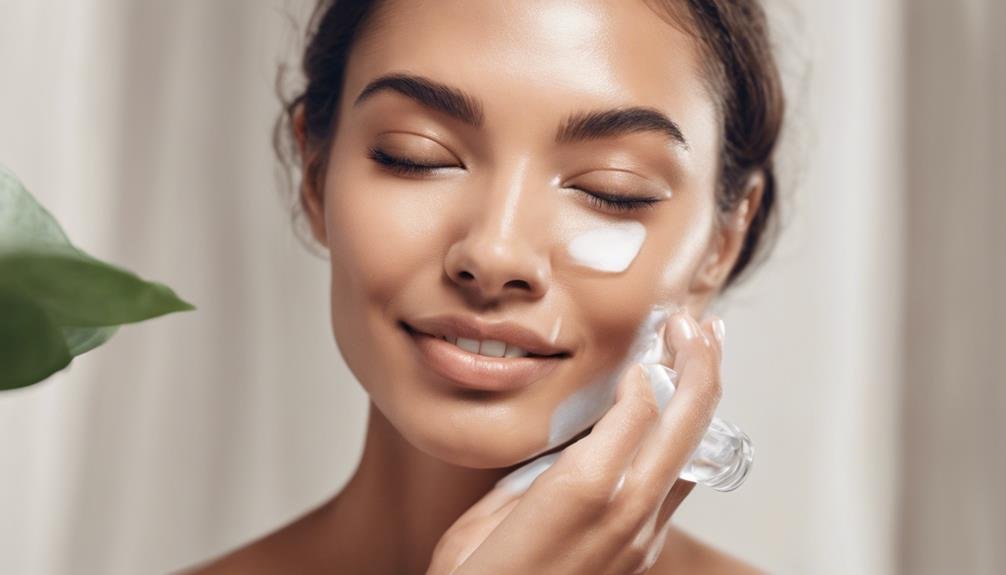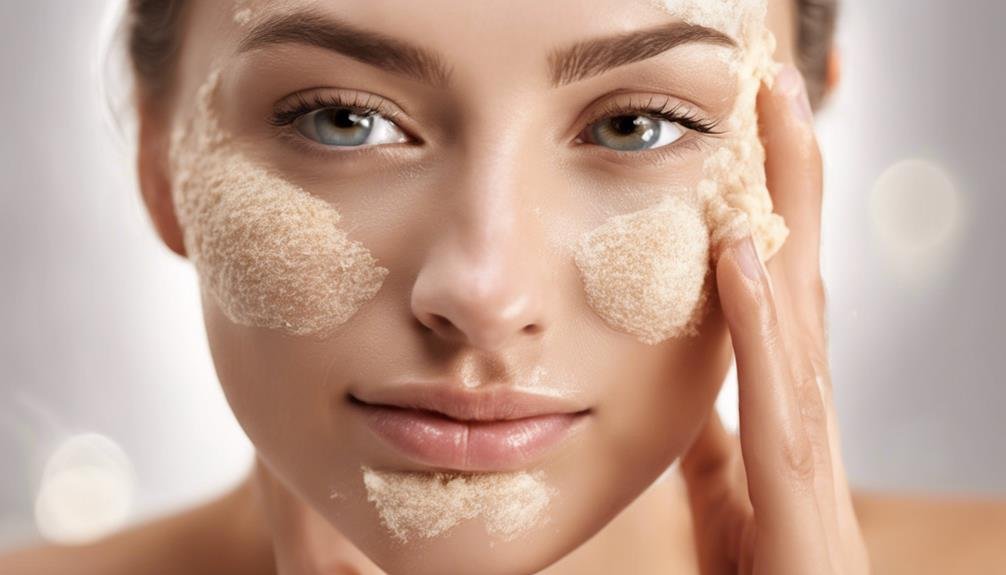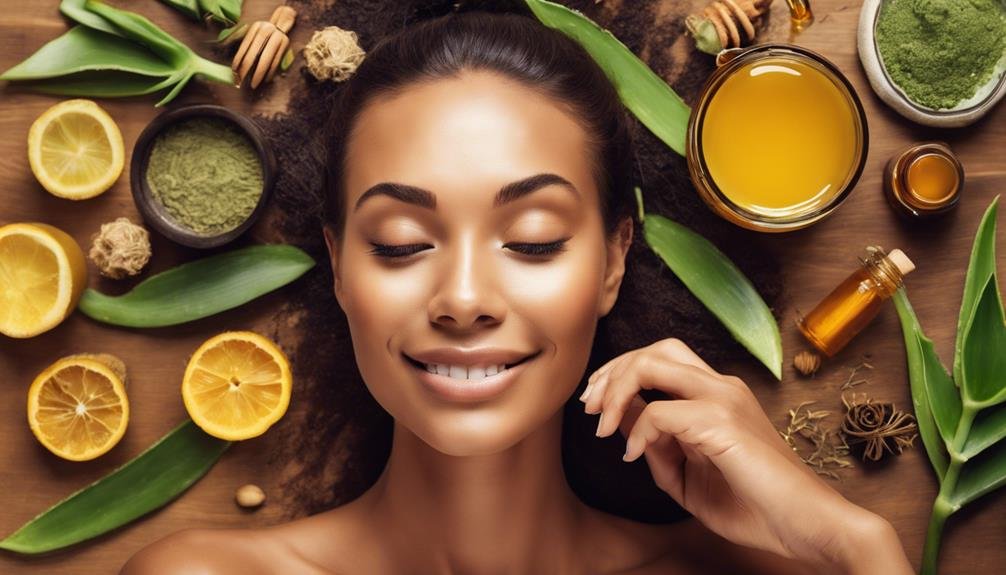"Cherishing Little Steps - A Haven for Baby and Family Journeys"
Glowing Skin Tips for Healthy Living
To achieve that coveted healthy glow, you must consider more than just what goes on your skin. Proper hydration, a balanced diet, exercise, and sun protection are crucial elements. But there's more to it than just the basics. Are you curious to uncover some lesser-known tips and tricks that can help enhance your skin's radiance and vitality? Stay tuned to discover some unexpected yet effective strategies that can transform your skin from dull to luminous.
Key Takeaways
- Stay hydrated with water and hydrating foods for glowing skin.
- Exercise regularly to boost circulation and collagen production.
- Protect skin from UV rays with sunscreen and protective clothing.
- Eat a balanced diet rich in nutrients like antioxidants and omega-3 fatty acids.
- Manage stress levels, get enough sleep, and follow a consistent skincare routine.
Skincare Routine

To achieve glowing skin, establishing a consistent skincare routine is essential. Your routine should include cleansing, toning, moisturizing, and protecting your skin from the sun.
Cleansing is crucial as it removes dirt, oil, and impurities that can clog pores and lead to breakouts. Choose a gentle cleanser suitable for your skin type, whether it's dry, oily, combination, or sensitive.
Follow up with a toner to balance your skin's pH levels and tighten pores.
Moisturizing is key to keeping your skin hydrated and healthy. Look for a moisturizer that suits your skin's needs, whether you need extra hydration, anti-aging properties, or oil control.
Don't forget to apply sunscreen every day, even on cloudy days, to protect your skin from harmful UV rays that can cause premature aging and skin damage.
In addition to these steps, consider incorporating exfoliation and serums into your routine for added benefits. Exfoliating helps remove dead skin cells, revealing a brighter complexion, while serums can target specific skin concerns like hyperpigmentation or fine lines.
Hydration Importance
Maintaining proper hydration levels is a fundamental aspect of skincare that directly contributes to achieving glowing skin. Hydration is crucial not only for your overall health but also for the appearance and health of your skin. When your body is adequately hydrated, your skin appears plumper, more radiant, and has a healthy glow. Dehydrated skin can look dull, dry, and even show more prominent wrinkles.
To maintain optimal hydration, aim to drink at least eight glasses of water daily and adjust this amount based on your activity level and climate.
Additionally, incorporating hydrating foods like fruits, vegetables, and herbal teas can further support your skin's hydration.
Using a good-quality moisturizer also helps to lock in moisture and prevent water loss from your skin.
Nutrient-Rich Diet

Ensuring your skin is nourished from the inside out is a key component in achieving that coveted healthy glow. A diet rich in essential nutrients can significantly impact the overall health and appearance of your skin.
Antioxidants, such as vitamins C and E, found in fruits and vegetables, help protect the skin from damage caused by free radicals. Omega-3 fatty acids, abundant in fish like salmon and flaxseeds, can help maintain skin elasticity and hydration. Zinc, present in nuts, seeds, and legumes, aids in cell regeneration and repair.
Additionally, consuming foods rich in collagen-building components like vitamin A, found in sweet potatoes and carrots, can promote skin firmness and elasticity. Remember, a balanced diet with a variety of colorful fruits, vegetables, lean proteins, and whole grains can provide the necessary nutrients for your skin to radiate health and vitality.
Regular Exercise
Incorporating regular exercise into your routine is a crucial factor in achieving and maintaining healthy, glowing skin. When you engage in physical activity, you increase blood flow, which delivers essential nutrients and oxygen to your skin cells. This process helps nourish your skin from within, giving it a radiant and healthy appearance.
Exercise also promotes the production of collagen, a protein that maintains skin elasticity and firmness. By keeping your skin supple and resilient, collagen helps reduce the appearance of wrinkles and sagging.
Furthermore, sweating during exercise helps to flush out toxins from your skin, preventing breakouts and promoting a clearer complexion. It also boosts your mood and reduces stress levels, which can have a positive impact on your skin health.
To reap the skin benefits of exercise, aim for at least 30 minutes of moderate physical activity most days of the week. Whether it's brisk walking, yoga, or dancing, find activities that you enjoy and make them a regular part of your routine for glowing skin.
Sun Protection

Regularly protecting your skin from the sun's harmful rays is essential for maintaining its health and youthful appearance. Sun exposure can lead to premature aging, wrinkles, sunspots, and even skin cancer. To shield your skin effectively, apply a broad-spectrum sunscreen with an SPF of 30 or higher every day, even when it's cloudy. Reapply every two hours, especially if you're swimming or sweating.
Additionally, seek shade during peak sun hours, typically between 10 a.m. and 4 p.m., when the sun's rays are strongest. Wearing protective clothing like wide-brimmed hats, sunglasses, and long sleeves can also help minimize sun damage.
Beauty Sleep
To maintain your skin's radiance and overall health, it's important to prioritize the quality of your sleep. Beauty sleep isn't just a saying; it has real effects on your skin. While you sleep, your body works on repairing and rejuvenating cells, including those in your skin. Lack of sleep can lead to increased stress hormone levels, causing inflammation and breakouts. Aim for 7-9 hours of quality sleep each night to give your skin the rest it needs to look its best.
During deep sleep, growth hormone is released, which helps in the repair and regeneration of skin cells. This is why getting enough shut-eye is crucial for a healthy complexion. Additionally, poor sleep can lead to increased water loss through the skin, making it look dull and dry. Establishing a bedtime routine, creating a calming environment, and limiting screen time before bed can all contribute to better sleep quality and ultimately, more radiant skin.
Stress Management

Managing stress is a key component of maintaining healthy, glowing skin. When you're stressed, your body releases cortisol, a hormone that can lead to inflammation and breakouts. Chronic stress can disrupt your skin's natural balance, making it look dull and tired.
To manage stress effectively, try incorporating relaxation techniques into your daily routine. Activities like yoga, meditation, deep breathing exercises, or even a simple walk in nature can help reduce stress levels and promote overall well-being. Additionally, getting regular exercise can boost endorphins, your body's natural mood lifters, and help combat stress.
It's also important to prioritize self-care and establish boundaries to prevent stress from taking over. Setting aside time for activities you enjoy, spending time with loved ones, and getting enough sleep are all crucial for stress management.
Cleanse & Moisturize
Stress can wreak havoc on your skin, but taking care of your skin through proper cleansing and moisturizing can make a world of difference.
Cleansing your skin daily helps to remove dirt, oil, and impurities that can clog pores and lead to breakouts. Look for a gentle cleanser that suits your skin type to avoid stripping away natural oils.
After cleansing, applying a moisturizer is essential to keep your skin hydrated and maintain its natural barrier function. Moisturizers help prevent water loss and can improve the overall texture and appearance of your skin.
Opt for a moisturizer with ingredients like hyaluronic acid or glycerin for maximum hydration.
Exfoliation Benefits

Wondering how you can achieve smoother, brighter skin? Exfoliation might just be the missing step in your skincare routine. This process involves removing dead skin cells from the outermost layer of your skin, revealing a fresh and radiant complexion underneath. By gently sloughing off these dead cells, exfoliation helps to unclog pores, prevent breakouts, and improve skin texture.
Regular exfoliation not only gives you a healthy glow but also allows your skincare products to penetrate deeper, maximizing their effectiveness. It can help with various skin concerns such as uneven skin tone, rough patches, and dullness. However, it's crucial to exfoliate gently and not overdo it, as harsh exfoliation can damage the skin barrier and lead to irritation.
There are different types of exfoliants available, including physical scrubs, chemical exfoliants like AHAs and BHAs, and enzyme exfoliators. It's essential to choose the right exfoliant for your skin type and concerns to reap the full benefits of this skincare step. Incorporating exfoliation into your routine 1-3 times a week can make a noticeable difference in the appearance and health of your skin.
Healthy Habits
Looking to maintain a healthy complexion? One of the key factors in achieving glowing skin is adopting healthy habits. By incorporating simple lifestyle changes, you can support your skin from the inside out. Here are some evidence-based tips to help you on your journey to radiant skin:
| Healthy Habit | Description | Benefits |
|---|---|---|
| Hydrate | Drink plenty of water throughout the day. | Keeps skin hydrated, flushes out toxins. |
| Balanced Diet | Eat a diet rich in fruits, vegetables, and nuts. | Provides essential nutrients for skin health. |
| Exercise Regularly | Engage in physical activity for at least 30 mins. | Boosts circulation, promotes skin health. |
Natural Remedies

To further enhance your journey towards luminous skin, exploring natural remedies can be a valuable addition to your skincare routine. Natural remedies can offer gentle and effective solutions for various skin concerns. Incorporating ingredients like aloe vera, known for its soothing properties, can help calm inflammation and hydrate the skin. Additionally, the antioxidant-rich properties of green tea can protect your skin from environmental damage and promote a healthy glow.
Consider incorporating honey into your skincare routine for its antibacterial and moisturizing benefits. A honey mask can help unclog pores and brighten your complexion.
Turmeric, with its anti-inflammatory properties, can be used to reduce redness and even out skin tone.
When using natural remedies, it's essential to perform a patch test to ensure compatibility with your skin. While natural remedies can be beneficial, it's important to remember that individual responses may vary. Experiment with different options to find what works best for your skin type and concerns.
Professional Consultation
Considering a professional consultation for your skin concerns can provide invaluable insights and tailored solutions to address specific issues effectively. A dermatologist or skincare specialist can offer a comprehensive assessment of your skin's condition, identifying underlying causes of concerns like acne, aging, or hyperpigmentation. By examining your skin type, lifestyle factors, and any previous treatments, they can recommend personalized skincare routines and treatments that suit your unique needs.
During a professional consultation, you can discuss your skincare goals and receive expert advice on the best products and procedures for achieving them. Whether you're dealing with persistent breakouts, uneven skin tone, or premature aging, a skincare professional can guide you towards evidence-based solutions that deliver visible results.
Additionally, they can help you navigate the overwhelming world of skincare products, ensuring you invest in items that are both effective and safe for your skin.
Frequently Asked Questions
Can Wearing Makeup Affect My Skin's Glow?
Wearing makeup can impact your skin's glow. Some products clog pores, leading to breakouts and dullness. Opt for non-comedogenic formulas. Regularly cleanse your face to prevent buildup. Prioritize skincare to maintain a healthy, radiant complexion.
How Can Air Pollution Impact My Skin's Health?
Air pollution can harm your skin by increasing free radicals, leading to premature aging, dryness, and dullness. Protect your skin by cleansing thoroughly, using antioxidants like vitamin C, and applying SPF daily.
Is There a Link Between Smoking and Dull Skin?
Smoking is linked to dull skin due to reduced blood flow and oxygen delivery. Chemicals in cigarettes damage collagen and elastin, leading to premature aging. Quitting smoking can help improve skin quality and overall health.
Does Stress Really Cause Skin Issues?
Wondering if stress causes skin issues? Absolutely! Stress hormones can trigger inflammation, leading to acne, eczema flare-ups, and premature aging. Combat stress by practicing mindfulness, exercise, and self-care to keep your skin radiant and healthy.
Can Genetics Play a Role in Skin Radiance?
Yes, genetics can indeed influence skin radiance. Factors like collagen production, skin pigmentation, and natural oil levels are all impacted by genetics. Understanding your genetic predispositions can help tailor your skincare routine for optimal results.
Conclusion
As you continue your journey towards glowing skin, remember that each step you take is like planting a seed in a garden. With consistent care and nourishment, your skin will bloom into a radiant flower that reflects the beauty of your overall health and well-being. Embrace the process, stay committed to your skincare routine, and watch as your skin blossoms into a masterpiece of natural beauty. Trust in the power of self-care and see the transformation unfold before your eyes.

